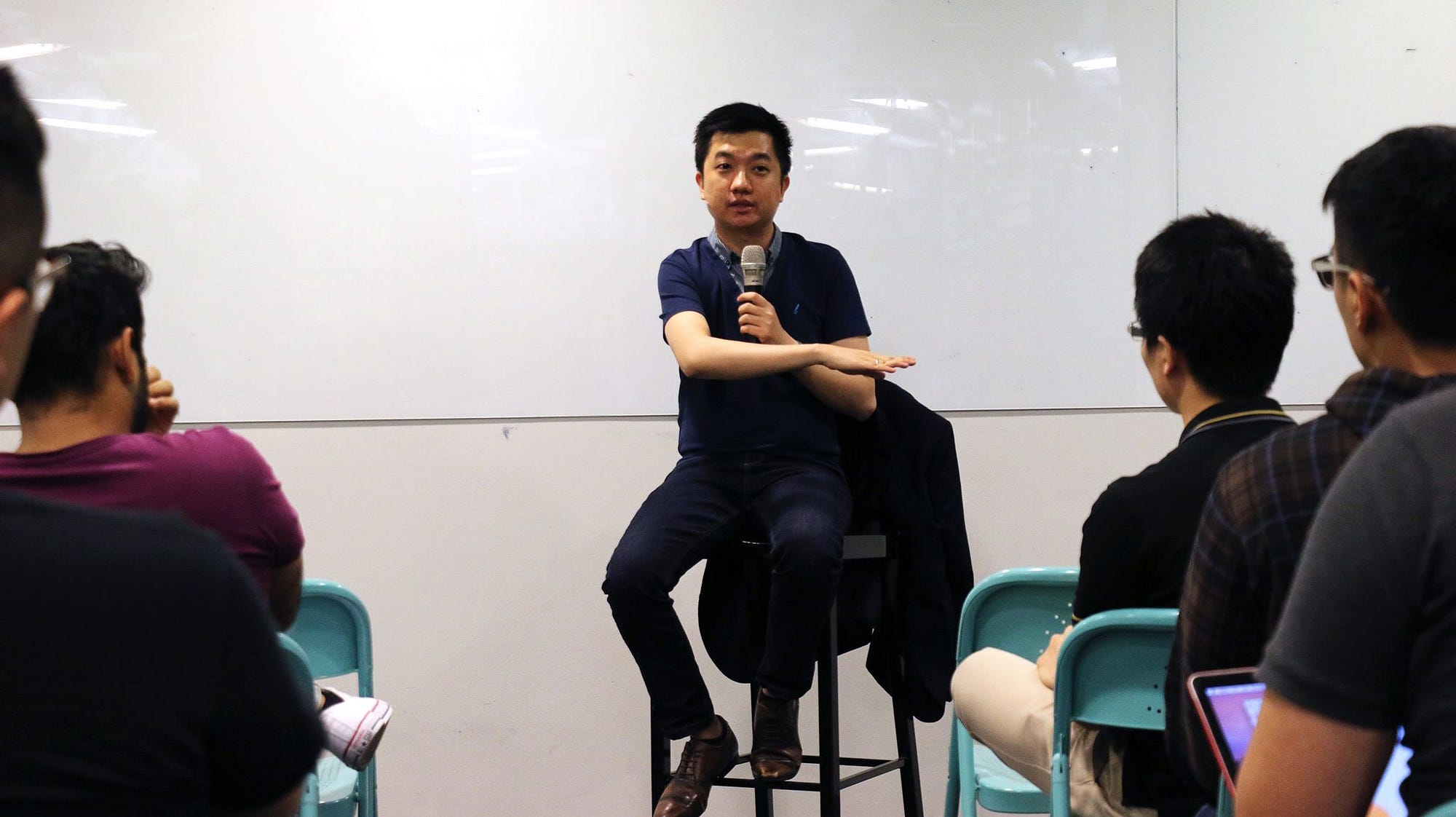
William Tanuwijaya, CEO of Tokopedia. Photo credit: NUS Enterprise Blk71.
You would expect to learn about ecommerce from a sharing session with the CEO of Tokopedia, one of Indonesia’s largest ecommerce marketplaces. But the biggest takeaway from the hour-long session was actually how to make choices in life.
Last week, William Tanuwijaya took over the stage at Kopi Chat. The event was hosted by NUS Enterprise and attended by young entrepreneurs from the NUS incubator, The Hangar.
After briefly sharing about his journey in growing Tokopedia — from a lonely university recruitment booth to becoming the leading ecommerce marketplace in Indonesia — William took questions from the floor. Here are the highlights:
Build a sustainable business, not an immediately profitable one
In response to a question on why Tokopedia does not offer cash-on-delivery (COD) services for their buyers, William dropped what was perhaps the biggest contrarian insight of the night.
Indonesia has many islands — 17,508 to be exact — and if the ecommerce site were to offer COD across the entire country, it would be extremely costly, especially for goods that would be returned. For this, William asked the audience to imagine a courier traversing seas and jungles or braving horrible traffic only to deliver the items all the way back on the buyer’s request. Even though COD opens up more consumers to Tokopedia, it is simply not a sustainable business model.
Cutting through the fog, William gave us his analysis of the problem. While Indonesia has a credit card penetration rate of about 3 percent, the real reason why consumers prefer COD is because they don’t trust merchants. Clearly, the solution is better directed toward increasing trust.
To address this, Tokopedia resolves to be transparent with their customers with shop reviews and trust badges to help in making better purchase decisions. Customers can also pay at local convenience stores.
Wrapping it up, William also explained why his company rarely offers discounts. Slashing prices to gain market share contradicts his philosophy of building a sustainable business. However, he did say that there was one caveat: discounts are only given to change a consumer habit, like switching from web to mobile app.
Choose which battles to lose
On his company’s expansion plans outside Indonesia, William borrowed concepts from Sun Tzu’s The Art of War.
If building a startup is like waging a war, then making decisions is like choosing your battles. In Tokopedia’s case, different markets represent different battle grounds, and its strategy to survive is to lose the battles outside Indonesia. Ironic as it may seem, it contributed to the ecommerce platform’s success in its own land.
William explained that some of his competitors had bigger ambitions than his. They chose to venture outside Indonesia early on, but it created two problems: they were unable to serve the local consumers well and ran out of cash faster.
Another way to look at it is the overall market potential. According to William, only one percent of Indonesians shop online. That means there is still huge potential left.
Fundraising requires luck—lots of it
The highly anticipated, head-scratching question on fundraising did not get a silver bullet. Instead, the answer tio the issue points back at fundamentals — build a sustainable business.
The CEO, who has raised up to US$250 million to date, admitted he has never written a single business plan. However, that doesn’t mean the rest of us shouldn’t. William quickly added that he should probably pick up the habit of doing that.
In William’s perspective, luck was a huge factor in both raising millions and having investors approach them. Here, he recounted the story of how Sequoia Capital’s Tan Ying Lan called him before his flight to Japan, found out which flight he was on, and appeared at arrivals to make him an offer. Coincidentally, William was in Japan to seek investment from Softbank too. Both deals received resounding yes-es.
Don’t juggle all 5 balls at once
The analogy of the five balls of life was first coined by then Coca-Cola CEO Brian Dyson. It speaks of five aspects of a person’s life—work, family, health, friends, and spirit—expressed as balls that we juggle. Four are made of glass and one is made of rubber. The rubber ball represents work.
Startups will face failure, that is why it is important to persevere and bounce back. But the other aspects of life don’t have the resiliency of the work ball. If they fall, they shatter.
It came very close for William when he declined accompanying his wife (then girlfriend) to Japan for her medical school graduation. He told us that he felt guilty afterwards. He also had often postponed holidays with his wife because a particular quarter was “too important for Tokopedia.”
William admitted that it was really hard for him to juggle his five balls of life all at once and if this had carried on, he would have broken some of them. His solution is to set aside two balls and focus only on juggling the other three well at any time.
Tokopedia closed the quarter outperforming expectations. William set aside his work ball, flew to Japan, and surprised his lovely wife with a marriage proposal. She said yes, completing the hat trick.




0 Comments